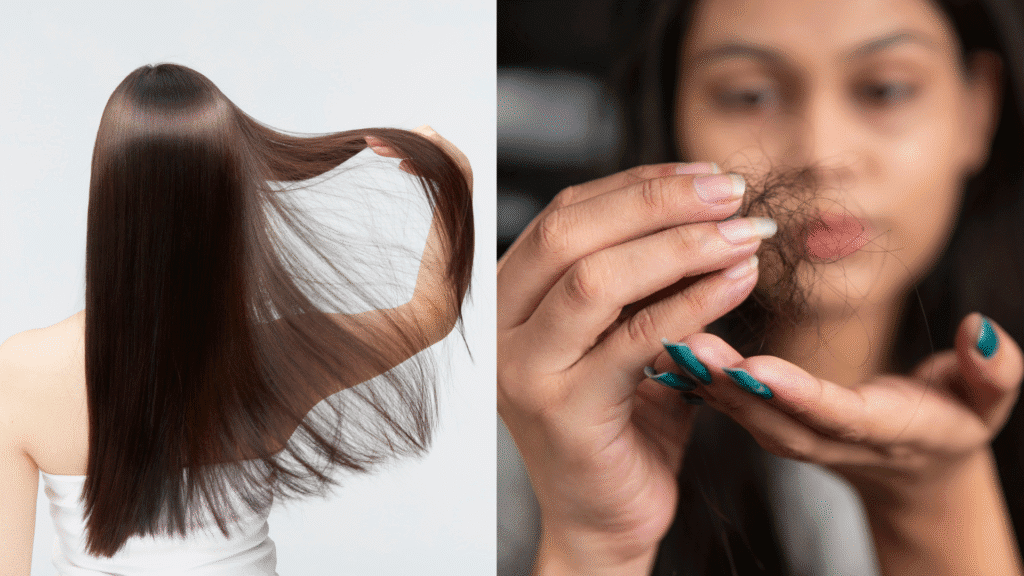
Have you recently recovered from viral fever, dengue, typhoid, COVID-19, or another major illness—only to notice excessive hair fall weeks later?
You’re not alone.
This condition is called post-viral telogen effluvium, a common but temporary form of hair loss triggered by physical or emotional stress. But while the condition is temporary, it can be alarming and affect your confidence.
The good news? Ayurveda offers holistic and natural solutions to help stop the hair fall, strengthen your roots, and restore your hair health from within.
Why Does Hair Fall Increase After Illness?
After a viral infection, your body prioritizes healing vital organs and immune function over non-essential functions like hair growth. As a result, more hair follicles shift into the resting phase (telogen)—leading to visible shedding 4–8 weeks after recovery.
Other contributing factors:
High fever
Antibiotic or antiviral medications
Stress and anxiety
Nutritional deficiencies (like Vitamin D, B12, iron, zinc)
Disturbed sleep and digestion
What Ayurveda Says About Hair Fall After Illness
In Ayurveda, hair fall (Khalitya) is often related to Pitta dosha aggravation, blood impurities, and weakened Agni (digestive fire). A viral illness disrupts your body’s internal balance (Tridoshas), leading to:
Hair follicle damage
Impaired tissue nutrition (Rasa, Rakta, Mamsa Dhatus)
Increased oxidative stress
To reverse this, Ayurveda focuses on:
Detoxification
Strengthening hair roots
Nourishing the scalp and tissues
Balancing Pitta and improving digestion
Ayurvedic Recovery Plan for Post-Illness Hair Fall
Here’s a natural, effective recovery plan:
1. Detoxification (Ama Nirharan)
After illness, toxins (Ama) remain in the system. Begin with gentle detox:
Triphala powder at night for mild cleansing
Guduchi + Neem for immunity and blood purification
2. Herbs That Support Hair Regrowth
Bhringraj – known as the “king of hair,” promotes new growth
Amla (Indian gooseberry) – rich in Vitamin C, boosts scalp circulation
Ashwagandha – reduces stress-related hair fall
Yashtimadhu (Licorice) – calms inflammation and nourishes the scalp
Take in the form of tablets, syrups, or decoctions as prescribed by an Ayurvedic doctor.
3. Scalp Oil Massage (Shiro Abhyanga)
Daily or weekly massage helps nourish follicles and relieve stress.
Best oils:
Bhringraj oil
Neelibhringadi oil
Coconut oil with curry leaves and methi
Massage gently in circular motion for 10–15 minutes before bath.
4. Reduce Stress with Lifestyle Therapies
Stress accelerates hair loss. Try:
Pranayama (Nadi Shodhana, Bhramari)
Yoga asanas for blood flow to the scalp (e.g., Adho Mukha Svanasana)
Ashwagandha or Brahmi tablets for calming the mind
5. Eat Right to Regrow Hair
Follow a Pitta-pacifying, nutrient-rich diet:
Ghee, coconut, soaked almonds, pumpkin seeds
Moong dal, cooked vegetables, seasonal fruits
Herbal teas (Brahmi, Amla, Yashtimadhu)
Avoid: spicy, fermented, and junk food; excess tea/coffee
When to Seek Help?
If your hair fall continues beyond 3 months or you see bald patches, consult a dermatologist or Ayurvedic practitioner for a customized treatment plan.
Final Thoughts: Your Hair Needs Time, Nourishment & Patience
Post-illness hair fall is reversible—but only with the right support and care. Ayurveda offers gentle yet powerful ways to heal from within, rejuvenate your hair roots, and bring back your confidence—without steroids or chemical-laden products.
Let your hair reflect your inner healing journey.

